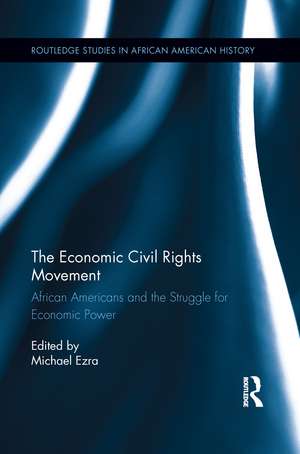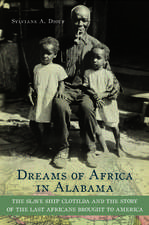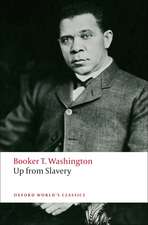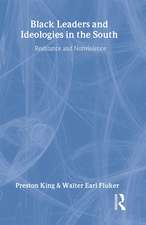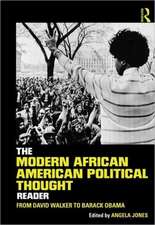The Economic Civil Rights Movement: African Americans and the Struggle for Economic Power: Routledge Studies in African American History
Editat de Michael Ezraen Limba Engleză Paperback – 16 sep 2015
The Economic Civil Rights Movement is a collection of thirteen original essays that analyze the significance of economic power to the black freedom struggle by exploring how African Americans fought for increased economic autonomy in an attempt to improve the quality of their lives. It covers a wide range of campaigns ranging from the World War II era through the civil rights and black power movements and beyond. The unfinished business of the civil rights movement primarily is economic. This book turns backward toward history to examine the ways African Americans have engaged this continuing challenge.
| Toate formatele și edițiile | Preț | Express |
|---|---|---|
| Paperback (1) | 403.58 lei 6-8 săpt. | |
| Taylor & Francis – 16 sep 2015 | 403.58 lei 6-8 săpt. | |
| Hardback (1) | 1094.45 lei 6-8 săpt. | |
| Taylor & Francis – 26 mar 2013 | 1094.45 lei 6-8 săpt. |
Preț: 403.58 lei
Nou
Puncte Express: 605
Preț estimativ în valută:
77.27€ • 80.46$ • 64.11£
77.27€ • 80.46$ • 64.11£
Carte tipărită la comandă
Livrare economică 12-26 februarie
Preluare comenzi: 021 569.72.76
Specificații
ISBN-13: 9781138952485
ISBN-10: 1138952486
Pagini: 214
Dimensiuni: 152 x 229 x 12 mm
Greutate: 0.32 kg
Ediția:1
Editura: Taylor & Francis
Colecția Routledge
Seria Routledge Studies in African American History
Locul publicării:Oxford, United Kingdom
ISBN-10: 1138952486
Pagini: 214
Dimensiuni: 152 x 229 x 12 mm
Greutate: 0.32 kg
Ediția:1
Editura: Taylor & Francis
Colecția Routledge
Seria Routledge Studies in African American History
Locul publicării:Oxford, United Kingdom
Public țintă
Postgraduate and UndergraduateCuprins
Introduction: The Economic Dimensions of the Black Freedom Struggle Michael Ezra Part I: African American Campaigns for Economic Power Before the Civil Rights Movement, 1925-1954 1. A. Philip Randolph, Early Pioneer: The Brotherhood of Sleeping Car Porters, National Negro Congress, and the March on Washington Movement Rhonda Jones 2. Mary McLeod Bethune, the National Council of Negro Women, and the Prewar Push for Equal Opportunity in Defense Projects gloria-yvonne 3. The Brooklyn Urban League and Equal Employment Opportunity in New York’s War Industries Carla J. DuBose 4. Early Economic Civil Rights in Washington, DC: The New Negro Alliance, Howard University, and the Interracial Workshop Derek Charles Catsam 5. The Moral Economy of Postwar Radical Interracial Summer Camping Orion A. Teal 6. The NAACP Boycott of the Amos ‘n’ Andy Show Justin T. Lorts Part II: African American Campaigns for Economic Power During the Civil Rights Era and Beyond 7. Economic Civil Rights Activism in Pensacola, Florida J. Michael Butler 8. Muhammad Ali’s Main Bout: African American Economic Power and the World Heavyweight Title Michael Ezra 9. Operation Breadbasket in Chicago: Between Civil Rights and Black Capitalism Enrico Beltramini 10. Progress Plaza: Leon Sullivan, Zion Investment Associates, and Black Power in a Philadelphia Shopping Center Stephanie Dyer 11. Black Power on the Factory Floor Kieran W. Taylor 12. Acquiring "A Piece of the Action": The Rise and Fall of the Black Capitalism Movement Ibram H. Rogers 13. Soul City, North Carolina and the Business of Black Power Christopher B. Strain
Recenzii
"These 13 essays, ably edited by Michael Ezra (Sonoma State Univ.), seek to highlight the economic dimensions and concerns of "the long civil rights movement"...[a] very nice collection of essays...Highly recommended." - R. M. Hyser, Choice
“…there is much insightful analysis throughout the book to warrant engaged reading…many of the essays in this collection…explore neglected or understudied topics…”-Francis Shor, Wayne State University, USA
“…there is much insightful analysis throughout the book to warrant engaged reading…many of the essays in this collection…explore neglected or understudied topics…”-Francis Shor, Wayne State University, USA
Descriere
Some books have linked economic developments to the civil rights movement, but none has taken the position that the movement was primarily an economic one. The Economic Civil Rights Movement responds to the lack of treatment that economic factors have received within civil rights scholarship. By highlighting the economic actions taken by civil rights leaders and organizations, this book helps to set the stage for narratives that recast the movement’s cultural and political significance. This collection posits that financial considerations were an important driving force behind the movement’s strategic initiatives. It argues that the movement’s economic aspects belong alongside its political and cultural impact at the narrative center of civil rights scholarship.
